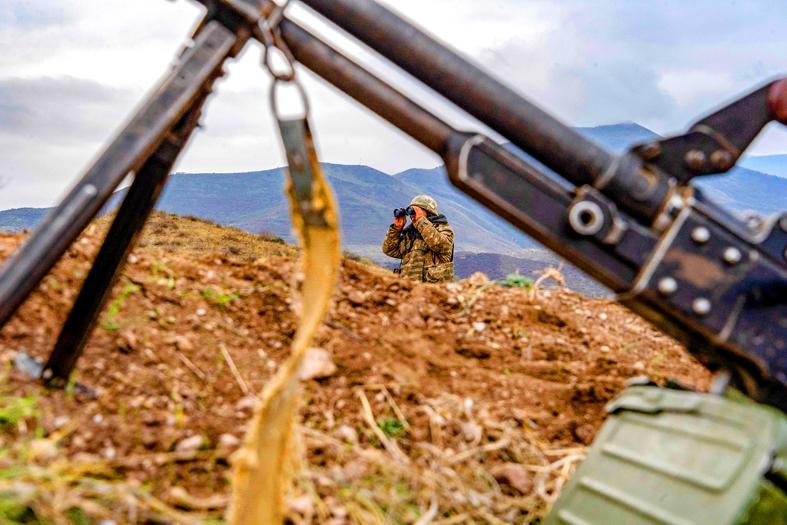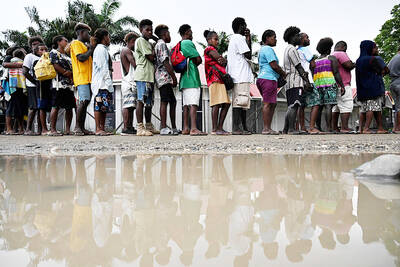An Armenian fighter in camouflage with a Kalashnikov assault rifle slung over his shoulder peered through binoculars over toward an encampment of Azerbaijani troops.
The rugged valley in Azerbaijan’s Nagorno-Karabakh region delineates the new and ambiguous border that separates the Armenian fighters and Azerbaijani forces after a peace deal ended weeks of fierce clashes.
However, wedged in the no man’s land between the soldiers is the pomegranate farm planted a decade ago by Vardges Harutyunyan, who was nervous that he would not be able to harvest the fruit this year.

Photo: AFP
“Now Azerbaijani soldiers are standing there,” Harutyunyan, 64, told reporters, looking toward the rows of carefully tended trees in the distance. “If this is theirs, what can we do?”
Clashes erupted in late September between separatists backed by Armenia who had held the territory for about 30 years and Azerbaijan’s army determined to wrest the mountainous region back under its control.
Several thousand were killed and many more displaced in the six weeks of fighting that was brought to a halt by a Russia-brokered peace agreement that saw the Armenians cede swathes of territory captured by Azerbaijan.
The new geography of Nagorno-Karabakh and several surrounding districts that were held by the separatists is being overseen by a force of about 2,000 Russian peacekeepers, many of whom previously served in Syria.
However, until they arrive to mark out land in the valley near the town of Askeran, Harutyunyan and the future of his fruit trees hangs in limbo.
Standing around the smoldering remains of a fire burning in rugged terrain, the former deputy head of the district’s police conceded that the end of the war had ushered in new uncertainty.
“We gave away half of the country,” Harutyunyan said.
In the hopes of finding clarity over access to his plot of land, Harutyunyan appealed to Arvid Gulyan, deputy head of agriculture in the district whose offices are in Askeran.
In Gulyan’s office, Harutyunyan traced a finger over a map of the region on the wall to locate his farm.
The local official was sympathetic, but unable to offer a solution.
“He wanted to know if the garden is on our side or on the side of the Azerbaijani side. But it’s not clear,” he told reporters. “The borders haven’t been established yet.”
The poor town nestled between steep slopes is decorated with Christian crosses, war memorials and flags of the province that declared autonomy in the 1990s, but was never recognized internationally. The separatists announced self-rule in a post-Soviet war that claimed 30,000 lives and saw Azerbaijani residents flee the region en masse.
With the realities of the deal still filtering through, the question of borders and many other things remains unclear.
Armenian Prime Minister Nikol Pashinyan’s decision to cede disputed territory has sparked a political crisis, with his career hanging in the balance.
French President Emmanuel Macron last week also raised questions over “ambiguities” in the agreement, pointing in particular to questions over refugees and Turkey’s role in the truce.
In Askeran, Gulyan told reporters that there had been unexplained power cuts and erratic gas supplies.
“We don’t know what will happen next,” he said.

SEEKING CHANGE: A hospital worker said she did not vote in previous elections, but ‘now I can see that maybe my vote can change the system and the country’ Voting closed yesterday across the Solomon Islands in the south Pacific nation’s first general election since the government switched diplomatic allegiance from Taiwan to Beijing and struck a secret security pact that has raised fears of the Chinese navy gaining a foothold in the region. The Solomon Islands’ closer relationship with China and a troubled domestic economy weighed on voters’ minds as they cast their ballots. As many as 420,000 registered voters had their say across 50 national seats. For the first time, the national vote also coincided with elections for eight of the 10 local governments. Esther Maeluma cast her vote in the
Nearly half of China’s major cities are suffering “moderate to severe” levels of subsidence, putting millions of people at risk of flooding, especially as sea levels rise, according to a study of nationwide satellite data released yesterday. The authors of the paper, published by the journal Science, found that 45 percent of China’s urban land was sinking faster than 3mm per year, with 16 percent at more than 10mm per year, driven not only by declining water tables, but also the sheer weight of the built environment. With China’s urban population already in excess of 900 million people, “even a small portion

UNSETTLING IMAGES: The scene took place in front of TV crews covering the Trump trial, with a CNN anchor calling it an ‘emotional and unbelievably disturbing moment’ A man who doused himself in an accelerant and set himself on fire outside the courthouse where former US president Donald Trump is on trial has died, police said yesterday. The New York City Police Department (NYPD) said the man was declared dead by staff at an area hospital. The man was in Collect Pond Park at about 1:30pm on Friday when he took out pamphlets espousing conspiracy theories, tossed them around, then doused himself in an accelerant and set himself on fire, officials and witnesses said. A large number of police officers were nearby when it happened. Some officers and bystanders rushed

HYPOCRISY? The Chinese Ministry of Foreign Affairs yesterday asked whether Biden was talking about China or the US when he used the word ‘xenophobic’ US President Joe Biden on Wednesday called for a hike in steel tariffs on China, accusing Beijing of cheating as he spoke at a campaign event in Pennsylvania. Biden accused China of xenophobia, too, in a speech to union members in Pittsburgh. “They’re not competing, they’re cheating. They’re cheating and we’ve seen the damage here in America,” Biden said. Chinese steel companies “don’t need to worry about making a profit because the Chinese government is subsidizing them so heavily,” he said. Biden said he had called for the US Trade Representative to triple the tariff rates for Chinese steel and aluminum if Beijing was